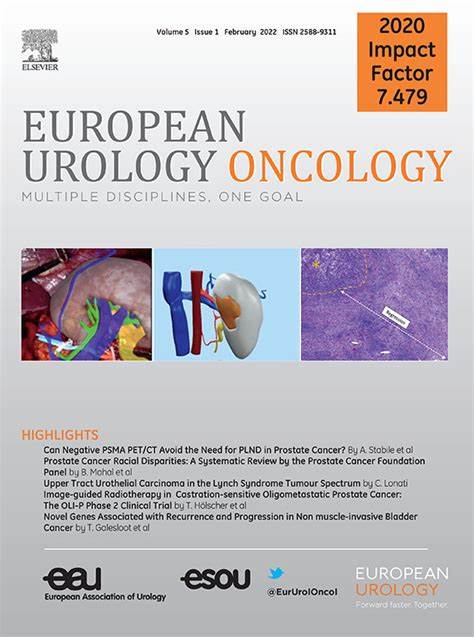PERSEUS1: An Open-label, Investigator-initiated, Single arm, Phase 2 Trial Testing the Efficacy of Pembrolizumab in Patients with Metastatic Castration-resistant Prostate Cancer with Mismatch Repair Deficiency and Other Immune-sensitive Molecular Subtypes
IF 9.3
1区 医学
Q1 ONCOLOGY
引用次数: 0
Abstract
Background and objective
Some metastatic castration-resistant prostate cancers (mCRPCs) present mismatch repair deficiency (MMRd) and other molecular subtypes potentially sensitive to immune checkpoint inhibitors (ICIs). The PERSEUS1 trial evaluated the response to pembrolizumab in these subtypes.
Methods
This open-label, investigator-initiated, single-arm, phase 2 trial used a two-stage Simon minimax design. Results from stage 1 are presented here. Tumour biopsies from patients with mCRPC progressing on standard therapies were analysed via targeted next-generation sequencing and immunohistochemistry. Patients with MMRd and/or other molecular subtypes associated with ICI sensitivity were treated with pembrolizumab until disease progression or unacceptable toxicity. The primary outcome was response by 24 wk using a composite of radiological objective response; confirmed decrease in prostate-specific antigen ≥50%; or conversion of circulating tumour cell count. The hypothesised desirable response rate was 40%, with 20% deemed unacceptable; >5/24 responses were required for progression to stage 2.
Key findings and limitations
In total, 25 patients from two centres received a median of 6 cycles (range 2–13) of pembrolizumab, with a response observed in seven (28.0%, 95% confidence interval 12.1–49.4%). Median progression-free survival was 2.8 mo and median overall survival was 16.0 mo. Nineteen patients (76%) experienced treatment-related adverse events, including three (12%) grade 3–4 events. There were no treatment-related deaths. While the prespecified threshold for futility was not met, slow accrual meant the study did not progress to stage 2.
Conclusions and clinical implications
Pembrolizumab showed antitumour activity against MMRd and/or other mCRPC molecular subtypes, with a manageable toxicity profile. Genomic and molecular stratification and further translational research are needed to refine patient selection for this therapy in the mCRPC setting.
PERSEUS1:一项开放标签、研究者发起、单臂、2期试验,测试派姆单抗对转移性阉割抵抗性前列腺癌患者的疗效,这些患者存在错配修复缺陷和其他免疫敏感分子亚型。
背景和目的:一些转移性去势抵抗性前列腺癌(mCRPCs)存在错配修复缺陷(MMRd)和其他可能对免疫检查点抑制剂(ICIs)敏感的分子亚型。PERSEUS1试验评估了这些亚型患者对派姆单抗的反应。方法:这项开放标签、研究者发起、单臂、2期试验采用两期Simon minimax设计。这里展示了第一阶段的结果。通过靶向新一代测序和免疫组织化学分析标准治疗进展的mCRPC患者的肿瘤活检。MMRd和/或其他与ICI敏感性相关的分子亚型患者接受派姆单抗治疗,直到疾病进展或不可接受的毒性。主要终点是24周的反应,使用放射客观反应的复合指标;证实前列腺特异性抗原下降≥50%;或者循环肿瘤细胞计数的转换。假设理想反应率为40%,20%被认为不可接受;>5/24反应需要进展到第2阶段。主要发现和局限性:来自两个中心的25例患者总共接受了中位数为6个周期(范围2-13)的派姆单抗治疗,其中7例(28.0%,95%置信区间12.1-49.4%)出现了缓解。中位无进展生存期为2.8个月,中位总生存期为16.0个月。19名患者(76%)经历了与治疗相关的不良事件,包括3例(12%)3-4级事件。没有与治疗相关的死亡。虽然没有达到预先设定的无效阈值,但缓慢的累积意味着研究没有进展到第二阶段。结论和临床意义:Pembrolizumab对MMRd和/或其他mCRPC分子亚型具有抗肿瘤活性,毒性谱可控。需要基因组和分子分层以及进一步的转化研究来完善mCRPC患者的选择。
本文章由计算机程序翻译,如有差异,请以英文原文为准。
求助全文
约1分钟内获得全文
求助全文
来源期刊

European urology oncology
Multiple-
CiteScore
15.50
自引率
2.40%
发文量
128
审稿时长
20 days
期刊介绍:
Journal Name: European Urology Oncology
Affiliation: Official Journal of the European Association of Urology
Focus:
First official publication of the EAU fully devoted to the study of genitourinary malignancies
Aims to deliver high-quality research
Content:
Includes original articles, opinion piece editorials, and invited reviews
Covers clinical, basic, and translational research
Publication Frequency: Six times a year in electronic format
 求助内容:
求助内容: 应助结果提醒方式:
应助结果提醒方式:


